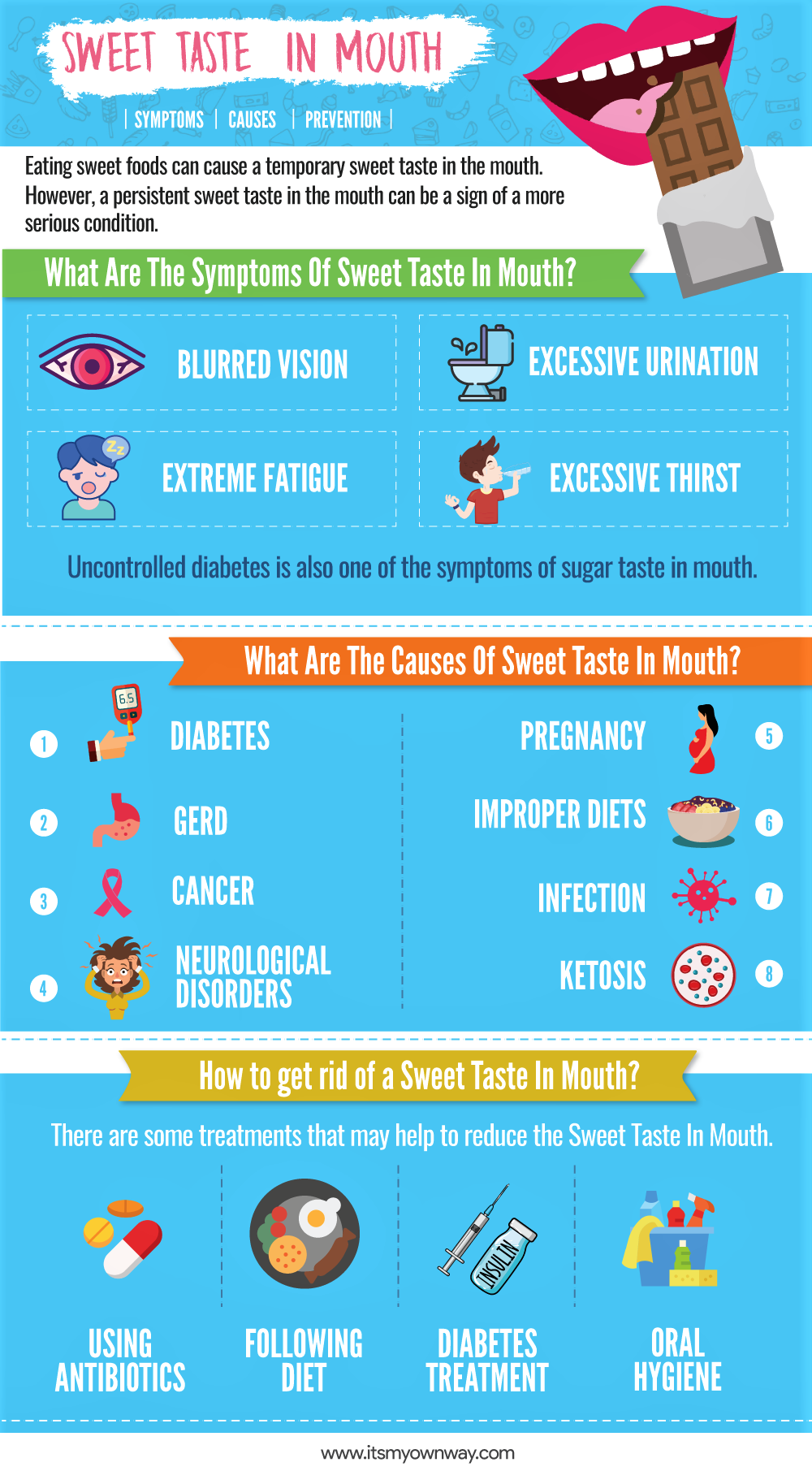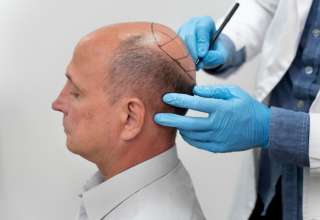Sweet taste in mouth usually comes from eating candy or drinking soda. However, if a sweet sensation frequently appears in your mouth without having any sugary foods, you should care about this condition. It is very important for you to know the reason why for this because it can be a sign of a health problem. So, this article will help you learn about the causes of sweet taste in the mouth as well as solutions to this problem.
What are the causes of the sweet taste in mouth?
Below are some common medical conditions that contribute to a sweet taste in the mouth.
-
Diabetes-
As per experts at CNS drug delivery, one common culprit for a persistent sweet taste in the mouth is diabetes. When the body struggles to regulate blood sugar levels, it can result in a sweet taste lingering in your mouth. If you have diabetes, elevated glucose levels might be behind this taste sensation. To learn more about the link between diabetes and sweet taste, you can check out this resource.
How can diabetes be treated?
Although medication is a recognized and effective treatment method for maintaining optimal blood sugar and insulin levels, it is crucial to understand that diabetes management extends beyond just medication. Proper dietary choices also play a crucial role in improving diabetic symptoms and overall well-being. It is important for individuals with diabetes to openly communicate their condition with a healthcare professional to ensure better outcomes in minimizing health issues and reducing the persistent sweet taste in the mouth.
By combining medication, appropriate diets, and open communication with a physician, individuals can take a comprehensive approach to managing their diabetes and improving their quality of life.
-
Sinus Infections-
Various kinds of infections can contribute to a constant sweet taste in the mouth. Scientists said that viruses and bacteria could have a bad impact on the nerves, which results in some changes in tastes. For example, a bacterium called Pseudomonas causes Pseudomonas infection, which can cause sinusitis along with changes in taste, including a sweet taste in the mouth.
According to a study by the National Institutes of Health published on its website, people suffering from blocked sinuses caused by inflammation have changes in taste, including a sweet taste in the mouth.
How can sinusitis (sinus infection) be treated?
When it comes to treating sinusitis, antibiotics are considered the trusted method, especially if the infection is caused by Pseudomonas. However, it is important to note that each case of sinusitis is unique, and seeking professional guidance from a doctor is crucial for effective treatment. Your physician will be able to assess your current condition and recommend the most suitable antibiotics for your specific situation. With a wide range of antibiotics available, it is essential to follow your doctor’s advice and take the prescribed medication as directed.
By doing so, you can ensure that the antibiotics effectively target the infection and help alleviate your sinusitis symptoms. Remember, the expertise of a healthcare professional is indispensable in achieving the best possible outcome in your sinusitis treatment.”
Improper Diets-
Nutritionists confirmed that inappropriate diets with dietary deficiency could lead to an uncommonly unpleasant sweet taste. They researched a group of men who were served improper diets for 60 days.
The results of the research showed that there was 80% of participants in this study had a sweet taste in mouth while the rest had experienced changes in taste including a sour taste, salty taste, and fatty taste.
Another recent study also found that zinc, folic acid, and vitamin B deficiency caused strange changes in taste.
How does an unhealthy diet contribute to a sweet taste in the mouth?
Inadequate dietary choices resulting in nutritional deficiencies can lead to an unpleasantly sweet taste in the mouth, as suggested by Your article. It is important to note that nutritionists have confirmed this correlation, specifically through a case study conducted on a group of men who consumed improper diets for a consecutive 60-day period.
Astonishingly, 80% of these individuals reported experiencing a sudden sweet taste in their mouths. The remaining 20% noted changes in taste perception, ranging from sour and salty to fatty flavors. Moreover, recent research has also highlighted the impact of deficiencies in essential nutrients, such as zinc, folic acid, and vitamin B, on taste alterations.
These findings further support the notion that an unbalanced diet lacking in vital nutrients can contribute to the development of an unusual sweet taste in the mouth. By considering these insights, individuals can better understand the potential consequences of unhealthy dietary habits and strive for a more balanced and nutritious eating regimen.
Other Health Conditions associated with the Sweet Taste Problem
Neurological Disorders-
Some neurological disorders, such as epilepsy, Alzheimer’s disease, or brain tumors can contribute to a sweet taste in the mouth. A study published in the Canadian Journal of Neuroscience Nursing showed that strokes and multiple sclerosis could lead to smell and taste disorders.
Neurological disorders impair the normal functions of the gustatory nerve in sending signals. So, we cannot feel the variety of taste and smell except for getting a sweet taste in the mouth.
-
Ketosis-
When the body needs high-fat content for energy production, the fat breakdown will result in the release of chemicals. The progress is called ketones. Also, ketones produce a byproduct known as acetone, which is responsible for the smell or taste in the mouth. Ketosis usually occurs when the level of blood sugar and insulin in the body decreases, causing a sweet taste in the mouth.
-
GERD (Acid Reflux)-
GERD (gastroesophageal reflux disorder) is caused by a stomach acid imbalance that pushes digestive enzymes from the stomach back into the food pipe, throat, and voice box. The backflow is blamed for changes in taste, including a sweet taste in the mouth. Gastroenterologists also confirmed that people with GERD usually like to sip sweet foods or soda drinks.
-
Cancer
Some types of cancer, like lung carcinoma, for example, cause sodium depletion (hyponatremia) due to the unbalance of antidiuretic hormone secretion. The condition, known as Syndrome of Inappropriate Antidiuretic Hormone Secretion (SIADH), can change a person’s sense of taste, including a constant sweet taste in the mouth.
Foods that Cause Sweet Taste in Mouth
Have you ever had a non-stop sweet flavor in your mouth, making you curious about where it came from? It’s important to know that different foods can make this happen, affecting how things taste to you. Let’s explore what might be causing that lasting sweet taste.
Impact of Artificial Sweeteners on Taste Perception
Artificial sweeteners, commonly found in sugar-free products, can trick your taste buds into perceiving sweetness. Even though these substitutes are low in calories, they can leave a lingering sweet taste in your mouth. Consuming foods and beverages containing artificial sweeteners regularly may desensitize your taste receptors, making you more sensitive to sweetness and potentially leading to a constant sugary taste.
Dietary Adjustments for Persistent Sweet Taste
Making dietary adjustments can help manage the constant sweet taste in your mouth. Consider reducing your intake of sugary and artificially sweetened foods. Opt for whole foods like fruits, vegetables, lean proteins, and whole grains to balance your taste buds and promote a more neutral flavor profile. Additionally, staying hydrated by drinking an adequate amount of water throughout the day can help cleanse your palate and reduce the sweet aftertaste.
Nutritional Deficiencies and Taste Changes
Nutritional deficiencies, such as zinc or vitamin B12 deficiency, can impact your taste perception and lead to unusual taste sensations, including a continuous sweet taste in your mouth. Ensuring you have a balanced diet rich in essential nutrients can support your taste buds’ proper functioning. If you suspect a nutrient deficiency, consult with a healthcare professional to address any underlying issues that may be contributing to the persistent sweet taste.
Photo by Rachel Claire
Dental Health and Sweet Taste in Mouth
Maintaining optimal oral hygiene plays a crucial role in our overall health, including our taste sensations. Let’s delve into how dental health can impact the constant sweet taste you experience in your mouth.
Oral Hygiene and Taste Sensation
Good oral hygiene practices go beyond just keeping your teeth clean; they also influence your taste perception. Studies have shown that issues like decayed teeth and poor oral hygiene can significantly reduce taste ability. Bacterial coatings on the tongue can affect taste perception, altering how you experience different flavors. Additionally, maintaining proper oral hygiene habits can help preserve your taste sensation and prevent taste disorders. Learn more about the impact of oral health on taste ability in this article.
Relationship Between Gum Disease and Taste Disorders
Gum disease can mess with your taste buds. It can cause flavor changes and a constant sweet taste. Knowing the link between gum disease and taste issues is key. Learn more about it here!For more insights, check out this informative read on bitter and sweet taste perception and its relationship to oral hygiene habits here.
Effect of Toothpaste on Taste Perception
The toothpaste you choose affects how you taste. Certain flavors and ingredients can make things taste sweeter. Some toothpaste components can briefly change how things taste. Pay attention to your toothpaste to manage your your constant sweet tastes. Learn more about oral health and taste buds here.
Understanding dental health and taste is crucial. Focus on good oral hygiene, watch for gum disease, and consider how toothpaste affects taste. Take steps to address taste-related concerns.
Lifestyle and Environmental Factors
Our lifestyle and environment can have a significant impact on how we perceive taste. Let’s explore how various factors, like smoking, pollution, stress, and medications, can influence our taste sensations.
Smoking and Changes in Taste
Smoking not only affects your health but can also alter your sense of taste. The chemicals in tobacco can dull taste buds and reduce your ability to taste flavors fully. If you’re a smoker experiencing a constant sweet taste in your mouth, quitting smoking may help regain your taste sensitivity.

Pollution and Taste Sensitivity
Environmental pollution can impact your taste sensitivity. Airborne pollutants can affect your taste receptors, leading to changes in how you perceive flavors. Taking steps to minimize exposure to pollutants can help maintain your taste perception.
Stress and Its Impact on Taste
Stress can also play a role in how you experience taste. High stress levels can alter your taste preferences and make you more sensitive to sweet flavors. Practicing stress-reducing techniques like meditation or exercise may help balance your taste sensations.
Medications That Alter Taste Sensation
Certain medications can interfere with your sense of taste, causing a constant sweet taste in your mouth. Medications like antibiotics, antihistamines, and even chemotherapy drugs can lead to taste disturbances. Consulting with your healthcare provider about potential side effects and alternatives may help address taste changes.
For further information on factors influencing taste perception, you can refer to resources like 11 Factors Influencing Taste Perception and 10 Surprising Factors That May Affect Your Taste.
Remember, understanding how lifestyle and environmental factors impact your taste can help you address and possibly alleviate the constant sweet taste in your mouth.
Remedies and Solutions
Dealing with a constant sweet taste in your mouth can be frustrating, but there are various remedies and solutions available to help address this issue. Here are some approaches you can consider:
Home Remedies for Constant Sweet Taste
- Maintain Proper Oral Hygiene: Brushing your teeth and tongue regularly can help eliminate any lingering sweet tastes caused by food particles.
- Stay Hydrated: Drinking an adequate amount of water throughout the day can help cleanse your palate and reduce the sensation of a sweet taste.
- Use Natural Mouthwash: Rinsing your mouth with a mixture of water and a teaspoon of baking soda can help neutralize the taste in your mouth.
Professional Treatments for Taste Disorders
If the sweet taste persists despite home remedies, consulting a healthcare professional may be necessary. They can conduct tests to determine if there are any underlying medical conditions causing the taste disorder.
Herbal Teas for Balancing Taste Sensation
Herbal teas like chamomile, peppermint, and ginger can help balance taste sensations in your mouth. These teas have natural properties that can refresh your palate and reduce any lingering sweet taste.

Vitamins and Supplements for Taste Correction
Certain vitamins and supplements like zinc and vitamin B12 are known to play a role in taste perception. Consult with a healthcare provider to see if supplementation could help correct any taste abnormalities you may be experiencing.
By exploring these remedies and solutions, you can take steps to address the constant sweet taste in your mouth and improve your overall taste sensation. Remember, individual results may vary, so it’s important to seek professional advice for persistent taste issues.
Medical Consultation and Diagnosis
When experiencing a constant sweet taste in your mouth, seeking medical consultation and a proper diagnosis is crucial for understanding the underlying cause. Here’s what you need to know about medical consultations and diagnoses for a sweet taste in the mouth.
When to See a Doctor for Sweet Taste in Mouth
If you have been consistently experiencing a sweet taste in your mouth without an obvious cause such as consuming sugary foods, it’s advisable to schedule a consultation with a healthcare provider. Persistent sweet tastes could indicate an underlying health issue that requires medical attention.
Tests for Diagnosing Taste Disorders
To diagnose the reason behind the constant sweet taste in your mouth, healthcare professionals may conduct various tests. These tests can include taste tests, blood tests, imaging scans, or a physical examination to determine the root cause of the taste disturbance.

Specialists for Taste Disturbances
In cases where the sweet taste persists and requires specialized care, consulting with an otolaryngologist or an ear, nose, and throat (ENT) specialist may be necessary. These healthcare professionals have expertise in diagnosing and treating conditions related to taste and smell disturbances.

Preparing for Your Doctor’s Visit: Sweet Taste in Mouth
Before your medical appointment, make notes of any symptoms, changes in taste perception, or relevant medical history related to the sweet taste in your mouth. Being prepared with this information can help your doctor make a more accurate diagnosis and recommend appropriate treatment options.

How to get rid of a sweet taste in mouth
As mentioned above, a sweet taste in mouth can be a sign of health issues. If you want to get rid of this condition, below is some advice for you:
Diabetes Treatment–
Medication is considered an obvious and effective treatment method to maintain good blood sugar and insulin levels. Proper diets also play an important part in improving diabetic symptoms and enhancing your overall health. People with diabetes should share their condition with a physician to get better results in minimizing their health issues as well as reducing a sweet taste in the mouth.
Antibiotics–
If you are suffering from sinusitis caused by Pseudomonas infection (sinusitis), antibiotics are considered the trusted treatment method. Depending on your current condition, while there are various antibiotics on the market, you should ask your physician for recommendations and guidance.
Diet–
A sweet taste in mouth can be the result of an improper diet, for instance, having high sugary or acidic foods. It negatively impacts the levels of insulin or blood sugar in the body and causes the condition. Therefore, you should set up a balanced diet with no artificial sweeteners such as soda or candies, which can help you get rid of a sweet taste.
Oral Hygiene–
A sweet taste in mouth can come from your bad oral hygiene habits. When small amounts of food are left in the mouth, it will produce some acids which make your saliva taste sweet the next day. Therefore, you should brush your teeth regularly and adequately, especially after having foods with high sugar content to avoid the condition.
Alternative Treatments
Depending on the condition of the sweet taste in mouth, the following alternative treatments may help you reduce the constant sweetness:
Antacids–
- Consume more lean protein, fresh veggies, and fruits.
- Reduce the intake of sugar, processed foods, and unhealthy fats.
- Probiotics supplements include kimchi, kefir, sauerkraut, yogurt, and miso soup.
Insulin Therapy–
- Digestion issues treatments.
- Be sure to see your physician if you are someone with diabetes or suffering from nerve damage.
Frequently Asked Questions-
What are some health conditions associated with the sweet taste problem?
Are there any specific health conditions associated with a sweet taste in the mouth during pregnancy?
Pregnant women often experience various changes in taste, including a sweet taste in the mouth. These changes are attributed to the hormonal fluctuations during pregnancy.
How can certain types of cancer lead to changes in taste, including a sweet taste in the mouth?
Lung carcinoma, a form of cancer, can cause sodium reduction due to an imbalance in antidiuretic hormone secretion. This imbalance can lead to changes in taste, including a sweet taste in the mouth.
What is GERD and how does it contribute to a sweet taste in the mouth?
GERD, or gastroesophageal reflux disease, is a digestive disease caused by a stomach acid imbalance. It pushes digestive enzymes back into the throat, leading to changes in taste, including a sweet taste in the mouth.
What are some neurological disorders associated with the sweet taste problem?
Neurological disorders such as sclerosis, strokes, brain tumors, Alzheimer’s disease, and epilepsy can trigger a sweet taste disorder.
Conclusion
In conclusion, dealing with a constant sweet taste in your mouth can be a persistent and concerning issue that may have a variety of underlying causes. It is essential to pay attention to your oral health as it can significantly impact your overall well-being. By addressing this symptom promptly, you can prevent potential dental issues and maintain optimal oral hygiene.
Remember, maintaining regular dental check-ups and practicing good oral hygiene habits are crucial steps in preventing and addressing any unusual taste sensations in your mouth. If the problem persists despite your efforts, seeking professional advice from a dentist or healthcare provider is recommended for a thorough evaluation and proper diagnosis.
By being proactive and taking control of your oral health, you can enjoy a fresh and healthy mouth free from constant sweet tastes, ensuring your overall health and well-being. Don’t hesitate to reach out for professional help if needed. Your oral health is key to your overall quality of life.















